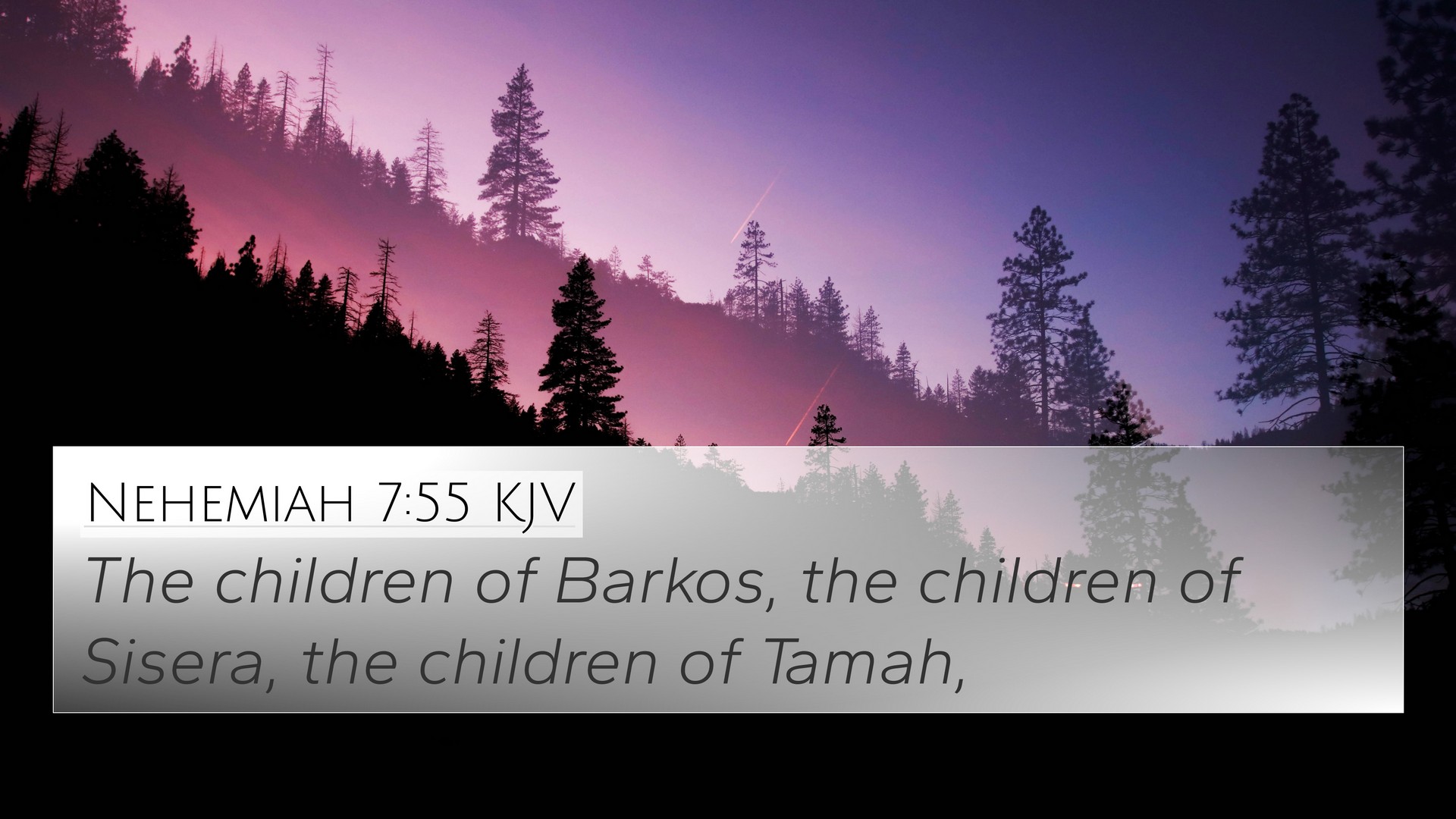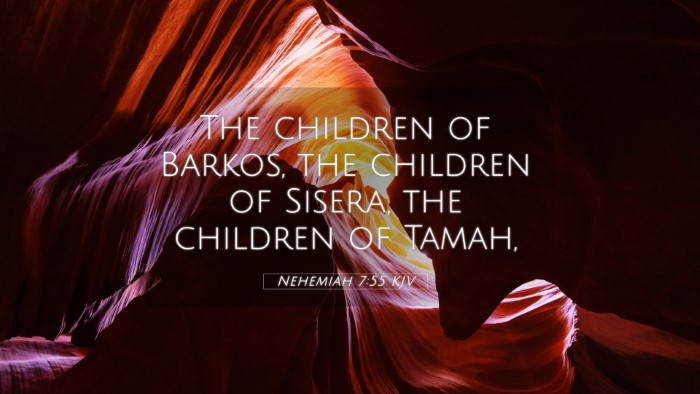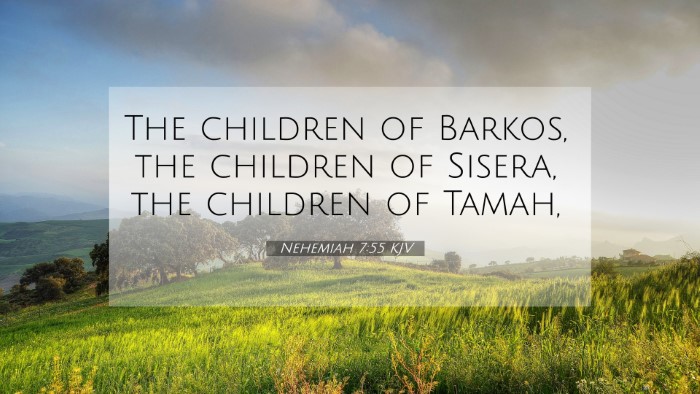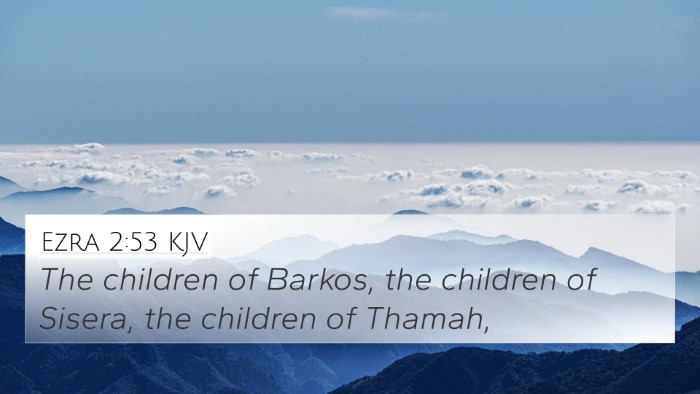Understanding Nehemiah 7:55
Bible Verse: Nehemiah 7:55 - "The sons of Solomon's servants: the children of Sotai, the children of Sophereth, the children of Peruda."
Summary of Nehemiah 7:55
This verse highlights the descendants of Solomon's servants, specifically mentioning three groups: the children of Sotai, Sophereth, and Peruda. It is part of a broader genealogical record which emphasizes the restoration of the Jewish community and their heritage after returning from Babylonian exile. Understanding this verse requires examining its context within the book of Nehemiah, especially regarding the themes of identity, service, and the community's connection to their history.
Insights from Public Domain Commentaries
-
Matthew Henry: Henry emphasizes the significance of genealogy in re-establishing the nation of Israel. Each name listed reflects not only a lineage but also their service and the roles they played in the rebuilding of Jerusalem. The mention of the servants of Solomon reminds the people of their royal heritage and the previous glory of Israel, urging them to consider their identity and roles within the reformed community.
-
Albert Barnes: Barnes elaborates on the importance of Solomon's servants, indicating their historical function within the temple and the administration of the kingdom. He suggests that naming them serves to reconnect the returning exiles with their ancestors who played a pivotal role in Israel's history, thus reinforcing the continuity of worship and service from the past into the present.
-
Adam Clarke: Clarke provides a detailed analysis of the names mentioned, interpreting them as belonging to groups that served in the temple. He points out that the mention of these servants signifies the reverence for past roles while also highlighting God's faithfulness in sustaining a lineage that contributes to ongoing worship and service in the post-exilic community.
Connections to Other Bible Verses
Nehemiah 7:55 resonates with several other scriptures that underscore the themes of service, heritage, and the importance of community identity. Here are 10 relevant cross-references:
- 1 Chronicles 2:55: "And the families of the scribes which dwelt at Jabesh..." - This verse reinforces the concept of genealogies and the roles of families in Israel.
- Ezra 2:55: "The children of Solomon's servants..." - A parallel mentioning of the descendants of Solomon’s servants, documenting their return from exile.
- Nehemiah 3:26: "Moreover, the Nethinims dwelt in Ophel..." - Discusses the role of various groups in the restoration efforts in Jerusalem.
- Nehemiah 11:3: "Now these are the chief of the province that dwelt in Jerusalem..." - Lists those who returned to inhabit and restore Jerusalem.
- Malachi 3:6: "For I am the Lord, I change not..." - Affirms God’s unchanging nature and His faithfulness across generations.
- Romans 12:1: "I beseech you therefore, brethren, by the mercies of God..." - Calls believers to present their bodies as living sacrifices, linking back to service.
- 1 Peter 2:9: "But ye are a chosen generation..." - Acknowledges the identity of God's people, similar to the restoration in Nehemiah.
- Revelation 21:12: "And had a wall great and high, and had twelve gates..." - Reflects on the importance of community and identity as the people of God.
- Hebrews 11:32-34: "And what shall I more say? For the time would fail me..." - Highlights the faith and heritage of those who served God.
- Philippians 3:20: "For our conversation is in heaven..." - Discusses the identity of believers as a community linked to a heavenly heritage.
Thematic Connections in the Bible
Nehemiah 7:55 serves as a reminder of several broader themes in the Bible, including:
- Identity and Heritage: The lines of genealogy often serve to reaffirm faith and community.
- Service to God: The roles occupied by these descendants illustrate the serving nature of God's people.
- Restoration: This verse is part of a narrative that emphasizes the restoration of Israel after exile.
- Continuity of God's Promises: The lineage speaks to God's promise to preserve His people throughout their history.
Using Cross-References in Bible Study
For those engaging in cross-referencing Bible texts, Nehemiah 7:55 provides rich opportunities for discovery. Here are some tools for Bible cross-referencing:
- Bible Concordance: Useful for finding key terms and their occurrences across scripture.
- Bible Cross-reference Guide: Helps in identifying related verses and themes, promoting deeper understanding.
- Cross-reference Bible Study: Encourages exploration of scripture in context, linking various themes and teachings together.
- Bible Reference Resources: Such as study Bibles that include notes specifically on genealogies and narratives.
- Bible Chain References: Lists passages that are interconnected, facilitating comprehensive study.
Conclusion
Nehemiah 7:55 is a significant verse within the narrative of the Jewish return from exile, highlighting the importance of lineage, service, and the commitment to restoring their identity as a people of God. By understanding its context and connecting it with other scripture, believers can gain insight into their identity and role within the greater narrative of faith. Employing methods of cross-referencing Bible texts enhances one’s study and understanding of the Scriptures, enabling a richer grasp of God’s Word and its applications.



